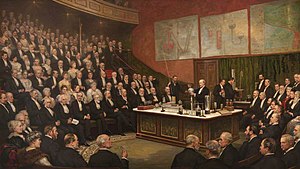
Back المعهد الملكي لبريطانيا العظمى Arabic Кралска институция на Великобритания Bulgarian Royal Institution of Great Britain Catalan Royal Institution of Great Britain German Reĝa Institucio Esperanto Royal Institution Spanish مؤسسه سلطنتی Persian Royal Institution Finnish Royal Institution French An Institiúid Ríoga Irish
 The Royal Institution building on Albemarle Street, London, c. 1838 | |
| Established | 1799 |
|---|---|
| Website | www |
The Royal Institution of Great Britain (often the Royal Institution, abbreviated Ri or RI) is an organisation for scientific education and research, based in the City of Westminster. It was founded in 1799 by the leading British scientists of the age, including Henry Cavendish and its first president, George Finch.[1] Its foundational principles were diffusing the knowledge of, and facilitating the general introduction of useful mechanical inventions and improvements, as well as enhancing the application of science to the common purposes of life (including through teaching, courses of philosophical lectures, and experiments).[2]

Much of the Institution's initial funding and the initial proposal for its founding were given by the Society for Bettering the Conditions and Improving the Comforts of the Poor, under the guidance of philanthropist Sir Thomas Bernard and American-born British scientist Sir Benjamin Thompson, Count Rumford. Since its founding it has been based at 21 Albemarle Street in Mayfair. Its Royal Charter was granted in 1800.
- ^ Caroe, Gwendy (1985). The Royal Institution : an informal history. London: J. Murray. ISBN 0719542456.
- ^ "Guides to the Royal Institution of Great Britain: 1 HISTORY" (PDF). Archived from the original (PDF) on 10 April 2016. Retrieved 15 February 2014.